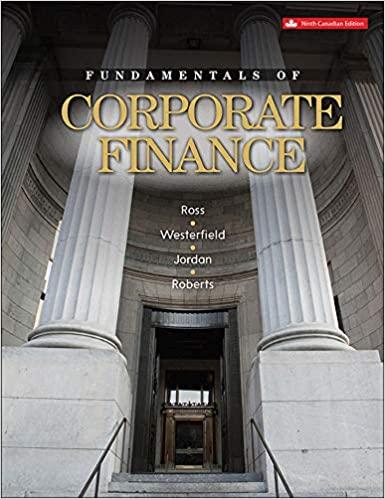McPhee Food Halls operated a chain of supermarkets in western Scotland. The company had had a lacklustre
Question:
McPhee Food Halls operated a chain of supermarkets in western Scotland. The company had had a lacklustre record, and, since the death of its founder in late 2005, it had been regarded as a prime target for takeover. In anticipation of a bid, McPhee's share price moved up from £4.90 in March 2006 to a 12-month high of £5.80 on June 10, despite the fact that the London stock market index as a whole was largely unchanged.
Almost nobody anticipated a bid coming from Fenton, a diversified retail business with a chain of clothing and department stores. Though Fenton operated food halls in several of its department stores, it had relatively little experience in food retailing. Fenton's management, however, had been contemplating a merger with McPhee for some time. They not only felt that they could make use of McPhee's food retailing skills within their department stores, but they believed that better management and inventory control in McPhee's business could result in cost savings worth £10 million.
Fenton's offer of 8 Fenton shares for every 10 McPhee shares was announced after the market close on June 10. Since McPhee had 5 million shares outstanding, the acquisition would add 5 x (8/10) = 4 million shares to the 10 million already outstanding. While Fenton's management believed that it would be difficult for McPhee to mount a successful takeover defence, the company and its investment bankers privately agreed that the company could afford to raise the offer if it proved necessary.
Investors were not persuaded of the benefits of combining a supermarket with a department store company, and on June 11, Fenton's shares opened lower and drifted down £.10 to close the day at £7.90. McPhee's shares, however, jumped to £6.32 a share.
Fenton's financial manager was due to attend a meeting with the company's investment bankers that evening, but before doing so he decided to run the numbers once again. First he reestimated the gain and the cost of the merger. Then he analyzed that day's fall in Fenton's stock price to see whether investors believed there were any gains to be had from merging. Finally, he decided to revisit the issue of whether Fenton could afford to raise its bid at a later stage. If the effect was simply a further fall in the price of Fenton stock, the move could be self-defeating.
The three common methods to value a company are asset-based valuation methods, comparables methods, and discounted cash flow valuation. Under the asset· based valuation method, a company is estimated as being worth the value of its net assets. There are three common ways of valuing its net assets: book value, liquidation value and replacement value. The Comparables approach is designed to predict how the public markets would value a company. These methods depend upon the use of financial ratios (e.g., price to book, price to earnings, etc.) from comparable companies. The discounted cash flow method is to estimate a stand-alone value for a company. The weighted-average cost of capital (WACC) is used to discount the company's estimated future cash flows.
Discounted Cash FlowsWhat is Discounted Cash Flows? Discounted Cash Flows is a valuation technique used by investors and financial experts for the purpose of interpreting the performance of an underlying assets or investment. It uses a discount rate that is most... Cost Of Capital
Cost of capital refers to the opportunity cost of making a specific investment . Cost of capital (COC) is the rate of return that a firm must earn on its project investments to maintain its market value and attract funds. COC is the required rate of... Financial Ratios
The term is enough to curl one's hair, conjuring up those complex problems we encountered in high school math that left many of us babbling and frustrated. But when it comes to investing, that need not be the case. In fact, there are ratios that,... Liquidation
Liquidation in finance and economics is the process of bringing a business to an end and distributing its assets to claimants. It is an event that usually occurs when a company is insolvent, meaning it cannot pay its obligations when they are due....
Step by Step Answer:

Fundamentals Of Corporate Finance
ISBN: 9781259087585
6th Canadian Edition
Authors: Stephen Ross, Randolph Westerfield, Bradford Jordan, Gordon Roberts





